WHO combats misinformation circulating on COVID-19
5 March 2020, Damascus - The World Health Organization (WHO) categorically refutes the misinformation circulating on social media that has been falsely accredited to WHO related to COVID-19 in Syria.
As per a statement by the Regional Director for the Eastern Mediterranean published on Tuesday 3 March, 2020, "1682 cases of Covid-19 disease in 14 countries in the Eastern Mediterranean Region, as of 2 March, at 6 pm local time in the city of Cairo, including 66 reported deaths in Islamic Republic of Iran.” Syria is not among these 14 countries.
WHO is working closely with the Syrian Ministry of Health with the aim of enhancing health preparedness and response to COVID-19, in accordance with the International Health Regulations (IHR 2005). Under this agreement, any cases of COVID-19 or other communicable diseases are directly reported to WHO.
WHO is working with the Ministry of Health on a daily basis on ensuring preparedness measures for the disease. WHO continues to provide technical guidance and support to the Ministry of Health. Public health laboratories in the Ministry of Health have been provided with laboratory kits sufficient to test a thousand people to diagnose potential COVID-19 cases.
WHO is also woking with the Ministry on raising public health awareness and encouraging healthy hygiene practices such as washing hands with water and soap frequently, following correct coughing and sneezing protocols, and avoiding crowded places. All these are key to protecting people from COVID-19.
According to WHO’s Director General, "our first enemy is not the virus; it is rather fear, and rumours about it." WHO recommends that only reliable sources of information such as WHO’s website and Ministry of Health platforms be used when verifying any information related to COVID-19.
Statement by the Regional Director Dr Ahmed Al-Mandhari on COVID-19 in the Eastern Mediterranean Region
3 March 2020
More information and guidance from WHO regarding the current outbreak of novel coronavirus
Syria: Health workers describe mayhem as WHO delivers urgent medicine and supplies to ensure continued health services
WHO provides more than 225 000 courses of treatment to internally displaced Syrians in Idlib and Aleppo
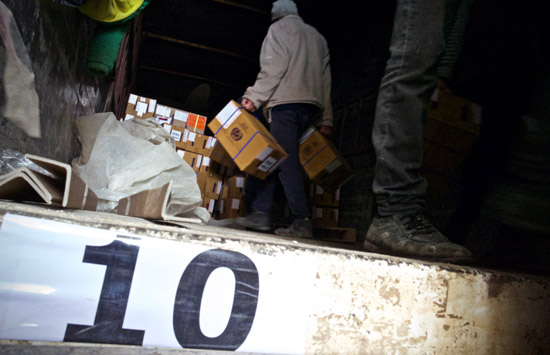 28 February 2020, Geneva/Copenhagen/Cairo – In a two-day operation the World Health Organization sent 55 tons of medicine and medical supplies in 7 trucks from Turkey into Idlib governorate and parts of Aleppo. Since December 2019 the area has witnessed the largest exodus of internally displaced Syrians in the 9-year history of the Syria conflict.
28 February 2020, Geneva/Copenhagen/Cairo – In a two-day operation the World Health Organization sent 55 tons of medicine and medical supplies in 7 trucks from Turkey into Idlib governorate and parts of Aleppo. Since December 2019 the area has witnessed the largest exodus of internally displaced Syrians in the 9-year history of the Syria conflict.
“This is the bleakest situation we’ve been in since the war started. Peoplehave no idea where to go, they only know they need to get away from the bombing,” says a surgeon in northwestern Aleppo governorate.
As hostilities and forced displacement towards the Turkish border continue the burden on health facilities is growing. Of the 84 health facilities forced to suspend operations since December last year just 31 have been able to relocate to places where people are seeking refuge from bombardments.
As a result, every 4 weeks 133 000 medical outpatient consultations do not take place, 11 000 trauma patients do not receive treatment and 1500 major surgeries are not performed.
Displacement has led to the depopulation of entire areas, resulting in disproportionate caseloads in Idlib's functioning health facilities. In some areas health facilities are deserted, in others they are stretched far beyond their capacity.
"These supplies meet a dire and growing need and will enable services to continue. In 3 months nearly 1 million people have been displaced”, says Richard Brennan, WHO Regional Emergency Director for the Eastern Mediterranean.
The supplies, transported in UN convoys via the Bab al Hawa and Bab al Sama border crossings on 25 and 26 February, included equipment for 3200 trauma and surgical treatments which is being distributed to WHO’s implementing health partners in more than 150 facilities - half of the functioning health facilities in northwest Syria.
“The burden and sacrifice of health workers in the northwestern governorates is unimaginable. It’s only a matter of days until we pass 1 million displaced people. That means health responders are working around the clock to serve patients, under enormous strain and often putting their lives on the line,” says Brennan.
While there has been a sharp rise in trauma cases, health workers are also treating respiratory tract infections due to poor shelter and harsh weather conditions, and complications of non-chronic diseases such as heart disease and diabetes which have been exacerbated by irregular access to medicines.
Partners of the World Health Organization providing health services in the area describe how overwhelmed health staff and facilities are.
“This is not sustainable. The majority of our hospital staff on the ground evacuated to the north with their families and then chose to return to Idlib city to continue taking care of patients. People’s mental health is poor, both of those seeking assistance and of health staff alike," said a pediatrician in Idlib city, before adding that there was neither the time nor the capacity to deal with issues that are not life-threatening,
“Primary health care centers and hospitals are trying to work with what they have but the caseload in some hospitals has doubled while resources are either what they were or less. The number of hospitals and health centers around us is still decreasing due to the frequent targeting of health facilities,” said a general practitioner working 10 km from Darat Izza in Aleppo governorate where two hospitals were attacked on 17 February. of particular concern are shortages of medicine, gloves, syringes and bandages.
As of 28 February, attacks on health care in Syria since the mass displacement started on 1st of December 2019 have caused 10 deaths and 37 injuries.
Stills and footage from Bab al Salam and Bab al Hawa border crossings, February 25-26, 2020.
For more information:
Hedinn Halldorsson
WHO Gaziantep
+90 538 544 29 57
Inas Hamam
WHO Regional Office
Cairo
+20 01000 157 385
WHO welcomes Japan’s donation of 5 ambulances and 2 mobile clinics
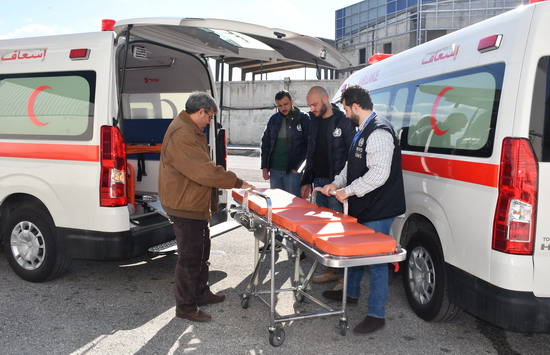
 17 February 2020 – WHO handed over 6 equipped ambulances to the Ministries of Health and Higher Education thanks to a generous donation from the Government of Japan. These ambulances are a vital boost to WHO’s efforts to support emergency and ambulance services with a view to improving the health outcomes of internally displaced people and local communities in south and northwest Syria, especially mothers and children, through reducing avoidable morbidity and mortality. In addition to the ambulances and as part of this same initiative, the Japanese Government is also providing 2 mobile clinics that will enhance the provision of primary health care services in the governorates of Aleppo and Al-Qunaitra.
17 February 2020 – WHO handed over 6 equipped ambulances to the Ministries of Health and Higher Education thanks to a generous donation from the Government of Japan. These ambulances are a vital boost to WHO’s efforts to support emergency and ambulance services with a view to improving the health outcomes of internally displaced people and local communities in south and northwest Syria, especially mothers and children, through reducing avoidable morbidity and mortality. In addition to the ambulances and as part of this same initiative, the Japanese Government is also providing 2 mobile clinics that will enhance the provision of primary health care services in the governorates of Aleppo and Al-Qunaitra.
Emergency medical situations require a prompt response and any delay can have serious consequences. The ambulances will strengthen the efforts of the 2 ministries to respond to the health needs of vulnerable people, especially in remote areas, as patients will be able to receive first aid support while on route to the nearest health facility.
“WHO’s priority is to support the Ministry of Health to prevent avoidable loss of life and further complications as a result of injury by providing immediate response and medical treatment to ensure the patients' survival,” said Dr Nima Abid, acting WHO Representative in Syria. “This new donation will be a major boost to enhancing emergency services provision in the country and will play a critical role in strengthening the referral system, a key aspect in the achievement of universal health coverage,” added Dr Abid.
While the 6 ambulances will strengthen the response to emergency and trauma cases and facilitate the referral of patients to hospitals, the 2 mobile clinics will provide primary health care services to rural areas in Aleppo and Al-Qunaitra where the number of returnees has significantly increased. On average, each mobile clinic can serve more than 3000 patients monthly. These include patients suffering from health problems, such as respiratory infections and chronic diseases, in addition to pregnant women and children in need of medical care.
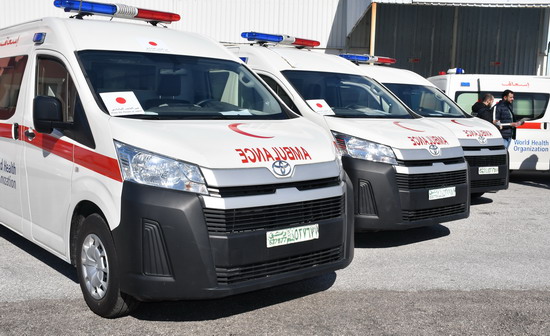 Based on the Health Resources and Service Availability Monitoring System at WHO (HeRAMS), the status of functionality of assessed public health facilities (hospitals and health centres) at the end of December 2019 was as follows:
Based on the Health Resources and Service Availability Monitoring System at WHO (HeRAMS), the status of functionality of assessed public health facilities (hospitals and health centres) at the end of December 2019 was as follows:
- Across Syria: Out of 1925 assessed public health facilities, 907 (47%) were reported fully functioning, 425 (22%) partially functioning, 593 (31%) non-functioning (completely out of service).
- Across Aleppo governorate: Out of 243 assessed public health facilities, 33 (14%) were reported fully functioning, 49 (20%) partially functioning, 161 (66%) non-functioning.
- Across Dar’a governorate: Out of 112 assessed public health facilities, 18 (16%) were reported fully functioning, 76 (68%) partially functioning, 18 (16%) non-functioning.
- Across Al-Qunaitra governorate: Out of 60 assessed public health facilities, 32 (53%) were reported fully functioning, 18 (30%) partially functioning, 10 (17%) non-functioning.
- Across Hama governorate: Out of 180 assessed public health facilities, 135 (75%) were reported fully functioning, 14 (8%) partially functioning, 31 (17%) non-functioning.
Maintaining services and equipment in health care facilities
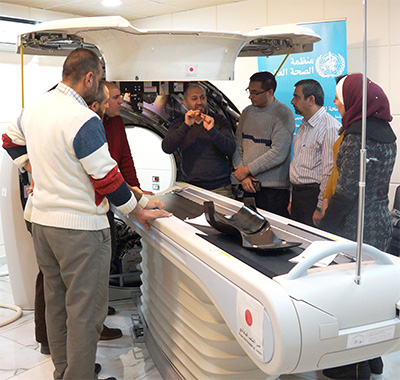 10 February 2020 – WHO welcomes the generous support from the Government of Japan to conducted training courses for Ministry of Health and Ministry of Higher Education engineers through the “ Training for All – (T4A)” project on acquiring the know-how in installing and maintaining lifesaving and state of-the-art medical equipment at health facilities inside Syria.
10 February 2020 – WHO welcomes the generous support from the Government of Japan to conducted training courses for Ministry of Health and Ministry of Higher Education engineers through the “ Training for All – (T4A)” project on acquiring the know-how in installing and maintaining lifesaving and state of-the-art medical equipment at health facilities inside Syria.
“Equipping health facilities with the right technology while building the teams’ technical skills will undoubtedly have a sustainable impact on the quality of medical services provision for years to come” said Dr Nima Abid, acting WHO Representative in Syria. “Training medical engineers and technicians on installing and maintaining equipment, in addition to scaling up their basic medical skills, is key to reducing the number of preventable deaths,” added Dr Abid.
With this kind contribution, WHO provided training for biomedical engineers on the installation, maintenance and proper use of advanced medical equipment. WHO also provided training for civil engineers and architects in the areas of design, maintenance and rehabilitation of health facilities. The training was supplemented by site visits to the various project locations to ensure proper implementation and smooth progress of activities.
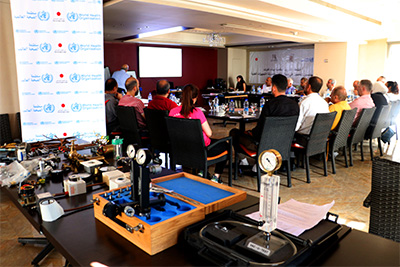 The T4A project consists of three phases and was first implemented in April 2017. The project was introduced in the governorates of Damascus, Homs, Aleppo, Daraa, Hama, As-Swieda, Lattakia, Tartous and Deir-ez-Zor. More than 625 medical engineers and technicians have been effectively trained on the use and maintenance of different types of X-rays, CT scan, catheterization, angiography and MRI machines, as well as endoscopy, ophthalmic and operation room equipment, and laboratory and physical therapy equipment. Phase III of the project was launched in April 2019, targeting 160 trainees.
The T4A project consists of three phases and was first implemented in April 2017. The project was introduced in the governorates of Damascus, Homs, Aleppo, Daraa, Hama, As-Swieda, Lattakia, Tartous and Deir-ez-Zor. More than 625 medical engineers and technicians have been effectively trained on the use and maintenance of different types of X-rays, CT scan, catheterization, angiography and MRI machines, as well as endoscopy, ophthalmic and operation room equipment, and laboratory and physical therapy equipment. Phase III of the project was launched in April 2019, targeting 160 trainees.
“The training was highly interactive and comprehensive; the discussions were lively, and the question-and-answer sessions were really helpful. I have a very good understanding of the X-ray machines now and will be able to spot any defects,” said Emtithal Babi, a medical engineer from the governorate of Aleppo. “We thank WHO and the people of Japan for supporting this training, which is so important for our health system,” she added.
The success of the T4A projects is well documented. The biomedical engineering training programmes, which were delivered by trained national experts, have helped in disseminating technical knowledge of basic medical equipment management, troubleshooting and repairs at the health facilities level. As a result, improvements in problem-solving and equipment downtime were observed across the Ministry of Health and Ministry of Higher Education health facilities. The programme will enable trained specialists to fully utilize the skills they have learned and to keep medical equipment functioning optimally for years to come. This will in turn greatly improve patient outcomes.








